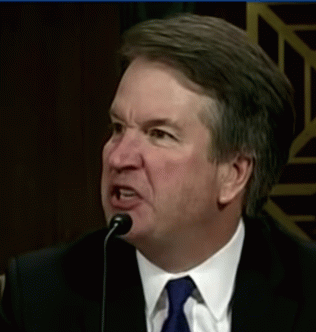Despite all of the press coverage of Brett Kavanaugh's Supreme Court confirmation, relatively little of it was on how that process itself could cause harm to many women for decades, even if he was innocent. Dr. Christine Blasey-Ford testified that someone she knew, Brett Kavanaugh, tried to rape her when she was 15 - so imagine you're another 15-year-old girl, Susie. . .
During the confirmation hearings, like most girls in your class, you can't help hearing quite a lot (at school, on your social media, and on Fox News at home) about the charges made against Kavanaugh by various women. Your parents have also been commenting every day about the latest developments: Your dad has made it clear he approves of how Senate Republicans and President Trump dismissed the charges as obviously false, while your mom uses it as a "teachable moment" to remind you it's a bad idea to get drunk at a party where guys are hoping for sex.
So you can't help imagining how your parents might respond if you were sexually assaulted by someone like Kavanaugh, a popular boy from a very respectable and well-to-do family - especially if his parents were people your parents knew and liked. Could their reactions be the same: to suspect he was right if he claimed you had made up your accusation because you wanted to get back at him for something? You'd obviously want very much to be able to go to your parents for support if you were sexually assaulted. . . but what if their response was similar to how they were responding to the accusations by Dr. Blasey-Ford?
You also can't help wondering if your chances of being believed by the rest of the world would be any better than Dr. Blasey-Ford's. When you watched her testify, you had a hard time not believing her - but then you watched Republican Senators apologizing to Kavanaugh for his mistreatment, and almost all dismissed the accusations of all three women. Finally, you watched the President apologize to Kavanaugh on behalf of the entire nation (including survivors of sexual assault) - and you - for how he had been treated by "evil people".
And you know you'd have a responsibility to report the crime to the police, so your classmate couldn't go on to assault others. . . but you can't help wondering about how the police would handle it. After all, you watched someone whose job was to prosecute criminals interrogate Dr. Blasey-Ford - but not her accuser - on TV. And after you heard about people with information that could support the stories of the women complaining that FBI investigators wouldn't talk to them, you watched the President report that Kavanaugh had been "proven innocent" by the FBI.
You also can't help wondering how much your life might be damaged by reporting the assault - and whether you're strong enough to take that, if you know that making the accusation might be pointless. . . You remember watching a video in which the President seemed to you to be publicly mocking and humiliating Dr. Blasey-Ford, and thousands of people laughed as he mimicked her testimony. (And you remember his statements after she told him how much that had hurt her: that it "didn't matter", and was even the right response because of the positive reaction: "We won.") You can't help imagining a crowd of people laughing at you. . .
You remember how her whole family had to hide, and move repeatedly, because of "endless" death threats after she accused a high school student of trying to rape her. . . Would you get any threats if you reported a rape attempt by someone who was really popular at your school, like the football quarterback who kept "accidentally" pressing against your friend's rear whenever he squeezed by her in the hall?
You also can't help remembering that after another woman also accused Kavanaugh, horrible rumors about her sex life quickly spread on social media. What sorts of rumors might the other football players start on social media if you accused their quarterback?
You even have to wonder whether you could be the one ending up in legal trouble, if you can't provide enough proof. You remember watching a group of women protesters who had been sexually assaulted asking why other people would dismiss such claims as obvious lies, and the President calling them paid protesters and not actual victims. . . The video of those rape victims being led off in handcuffs for publicly airing their claims hit you pretty hard. You also remember watching news footage of the President at a recent rally: listening to chants calling for Dr. Blasey-Ford to be locked up for reporting her assault, and not pushing back against that. And finally, you remember hearing that a Senator directed the FBI to investigate one of Kavanaugh's accusers, and possibly charge her with a felony, because he didn't believe her.
You had always thought that if a classmate tried to rape you, you would report it to the police. . . but after everything you've seen and heard in the past several weeks, you have to ask yourself if that would be worth taking all of those risks - or if it would actually make more sense to keep it secret, just like most women do for such reasons.





